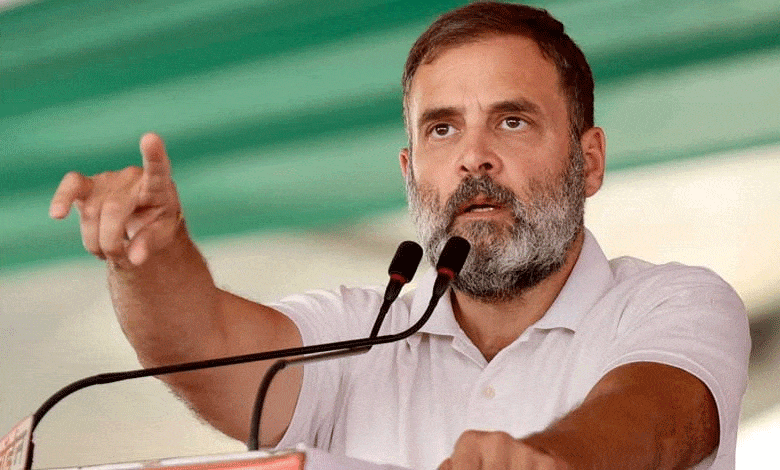Rahul Gandhi Joins DMK Student Wing Protest Against UGC Draft Rules: Here Are the Details
"Rahul Gandhi joins the DMK student wing protest at Jantar Mantar against UGC draft rules, alongside Akhilesh Yadav and INDIA bloc leaders. Get full details on the political pushback and its implications."

New Delhi: In a significant political move, Congress leader Rahul Gandhi, Samajwadi Party Chief Akhilesh Yadav, and several MPs from the Dravida Munnetra Kazhagam (DMK) are set to participate in a student-led protest against the University Grants Commission (UGC) draft rules.
The demonstration, organized by the DMK’s student wing, will take place at Jantar Mantar in Delhi today at 10 a.m.
The protest aims to challenge the UGC’s proposed guidelines, which grant Governors—acting as Chancellors—enhanced authority in appointing vice-chancellors to state-funded universities.
Table of Contents
Opposition parties and several state governments argue that these rules undermine the principles of federalism and interfere with state autonomy in higher education governance.
Tamil Nadu Leads Opposition Against UGC Draft Rules
The Tamil Nadu Assembly took a firm stand against the UGC’s proposed regulations by passing a resolution on January 9, calling for their withdrawal. Tamil Nadu Chief Minister M.K. Stalin criticized the rules, labeling them an “assault on federalism” that threatens the state’s higher education system.
Stalin has been vocal in his opposition, writing to Union Education Minister Dharmendra Pradhan to demand the retraction of the draft guidelines. Additionally, he urged Chief Ministers of other opposition-ruled states to pass similar resolutions in their respective Assemblies.
Concerns Over UGC Draft Rules and Higher Education Reforms
The UGC’s new draft guidelines propose significant changes to the higher education system, including:
- Expanded Eligibility Criteria for Vice-Chancellors:
- The rules allow candidates from non-academic backgrounds, including the private sector, to be considered for the post of vice-chancellor. Critics argue that this provision could lead to politically motivated appointments, potentially compromising academic integrity.
- Revised Faculty Selection Process:
- Under the new guidelines, candidates can qualify for faculty positions by clearing the UGC-NET exam in a subject of their choice, regardless of their undergraduate and postgraduate disciplines. Academicians fear that this change may dilute the quality of faculty recruitment.
- Changes in Appointment Committees:
- The committee responsible for appointing vice-chancellors will consist of three members: one nominated by the chancellor (Governor), one by the UGC Chairman, and one by the university’s executive council or senate. Critics argue that this structure centralizes control with the Centre, diminishing the role of state governments in higher education governance.
DMK’s Student Wing and Nationwide Protests
The DMK student wing has been at the forefront of opposition against the UGC’s new policies. On January 10, the wing staged a major protest at Valluvar Kottam in Chennai, condemning the draft rules as an infringement on state rights and academic independence.
As the opposition gathers momentum, several other parties within the INDIA bloc have expressed solidarity with Tamil Nadu’s stance. Today’s protest in Delhi is expected to draw a significant number of student activists, academic scholars, and political leaders who stand against the proposed reforms.
UGC Defends Draft Guidelines Amid Backlashes
Despite mounting opposition, UGC Chairman M. Jagadesh Kumar has defended the proposed reforms. According to him, the revised selection process “eliminates ambiguity and ensures transparency.”
“The new structure ensures that vice-chancellor appointments are based on merit rather than political influence. By including professionals from academia, research institutions, public policy, and industry, we are broadening the scope for selecting competent leaders,” Kumar stated.
He also emphasized that the inclusion of industry and public policy professionals in the eligibility criteria would foster interdisciplinary expertise in higher education administration.
Political Implications and Future of the Protest
With Congress, DMK, Samajwadi Party, and other opposition leaders rallying against the UGC’s proposed rules, today’s protest at Jantar Mantar could mark a significant moment in the broader struggle for state autonomy in education.
The demonstration also signals a growing opposition front ahead of the 2024 general elections, as parties unite against what they perceive as the BJP-led central government’s overreach into state affairs.
As the protest unfolds, all eyes will be on the Centre’s response and whether the UGC is willing to reconsider its draft guidelines in light of the strong political pushback.
Stay tuned for further updates on this developing story
